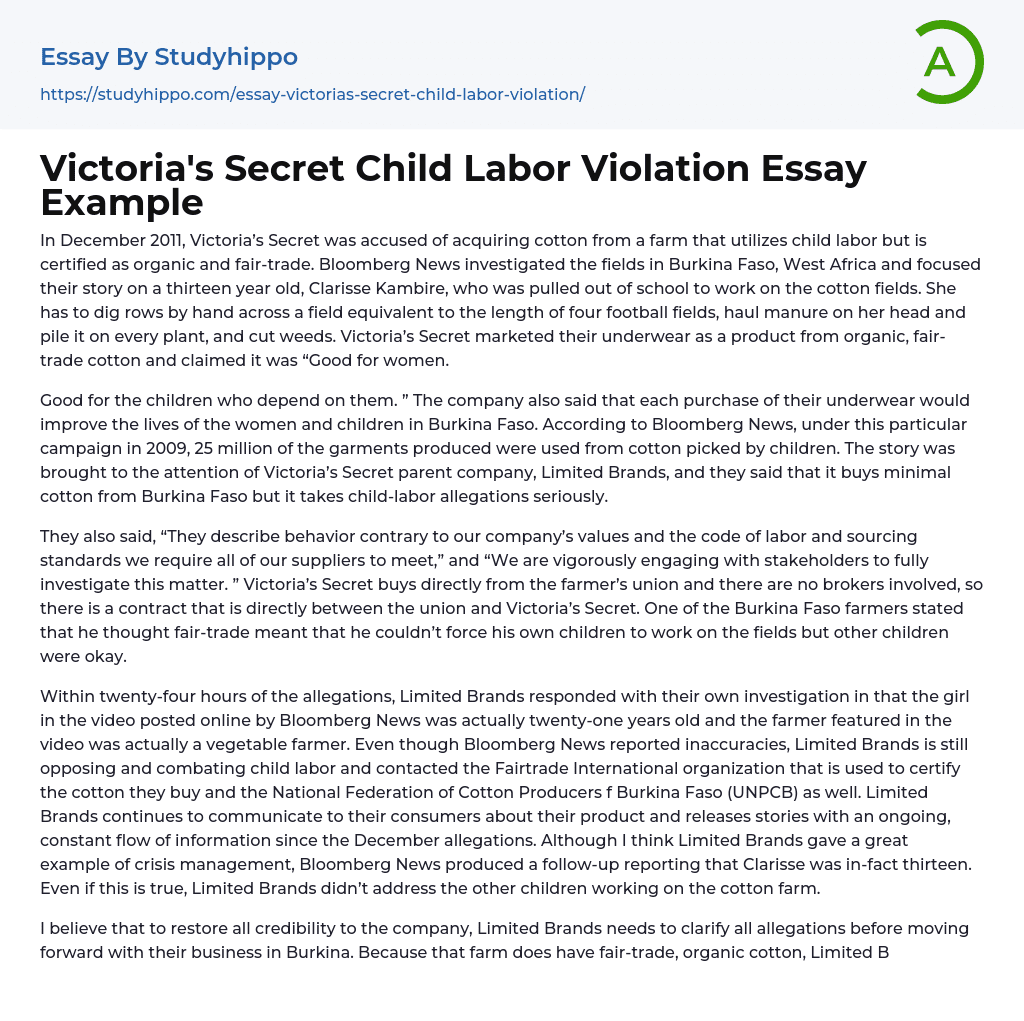During December 2011, Victoria's Secret created controversy due to their sourcing of cotton from a farm located in Burkina Faso, West Africa. Despite being certified as organic and fair-trade, this particular farm employed child labor. Bloomberg News conducted an investigation that shed light on the story of Clarisse Kambire, a thirteen-year-old girl who was compelled to abandon her education and work in the cotton fields. Her tasks involved physically digging rows across a field that was four times longer than a football field, carrying manure on her head for spreading it on every plant, and cutting weeds. Meanwhile, Victoria's Secret advertised their underwear as being made from organic, fair-trade cotton with benefits specifically for women.
According to Bloomberg News, during a specific campaign in 2009, the company produced 25 million garments using cotton harvested
...by children. The parent company of Victoria's Secret, Limited Brands, became aware of this issue and emphasized its dedication to addressing allegations of child labor. They clarified that they only purchase a small amount of cotton from Burkina Faso. The company claims that their underwear is beneficial for children who rely on them and that purchasing their underwear would improve the lives of women and children in Burkina Faso.
Victoria's Secret has stated that the specified conduct contradicts their corporate values and the labor and sourcing standards required for their suppliers. They have pledged to carry out a thorough investigation in partnership with relevant parties. Victoria's Secret procures directly from the farmer's union, bypassing intermediaries, resulting in a contractual agreement between the union and the company. A farmer from Burkina Faso has shared his conviction that fair-trad
entails refraining from employing his own children on the fields while permitting other children to work.
Limited Brands promptly responded to the accusations by conducting their own inquiry, completing it within twenty-four hours. They determined that the individual featured in the video shared by Bloomberg News was actually a twenty-one-year-old woman, not thirteen as initially claimed. Furthermore, they uncovered that the person identified as a farmer in the footage was actually involved in vegetable farming and not connected to cotton production. Despite these discrepancies highlighted by Bloomberg News, Limited Brands remains steadfast in its commitment to combat child labor. In order to ensure this objective is met, they have sought certification from Fairtrade International and the National Federation of Cotton Producers of Burkina Faso (UNPCB) for their cotton procurement process. Since the allegations surfaced in December, Limited Brands has maintained constant communication with their consumers by regularly sharing updates and information. Nevertheless, Bloomberg News released a subsequent report asserting that Clarisse, the girl at the center of this issue, was indeed thirteen years old. Although this claim may be accurate, Limited Brands did not address whether other children were working on the cotton farm.
Limited Brands should address all accusations regarding their business in Burkina to regain trust. Although the concerned farm cultivates fair-trade, organic cotton, Limited Brands should work together with them to ensure no child labor is involved. Since Limited Brands believes that sourcing cotton from this farm enhances the well-being of women and children and has maintained a long-standing supplier relationship with them, they should contemplate giving the farm another chance before exploring alternative cotton suppliers.
Limited Brands should
search for an alternative cotton supplier for their Victoria's Secret brand if Burkina Faso farmers do not comply. This is because Limited Brands only receives a small amount of cotton from Burkina Faso. Furthermore, Limited Brands should keep visiting Burkina Faso to monitor workplace conditions and ensure they are in line with the company's values, especially if they choose to maintain business relations with them.
- Advertising essays
- Audience Theory essays
- Competitor Analysis essays
- Consumer essays
- Marketing Management essays
- Marketing Mix essays
- Marketing Plan essays
- Marketing Research essays
- Marketing Strategy essays
- Point Of Sale essays
- Price essays
- Procurement essays
- Product essays
- Product Differentiation essays
- Promotion essays
- Promotion And Marketing Communications essays
- Retailing essays
- Trademark essays
- Anheuser-busch essays
- Brands essays
- Detergent essays
- Product Placement essays
- Research Design essays
- New Product Development essays
- Advertisement essays
- Brand essays
- Sales Promotion essays
- Advertising campaign essays
- Consumer behaviour essays
- Offer And Acceptance essays
- Wal-Mart essays
- Discover essays
- Child essays
- Child labor essays
- Childcare essays
- Affirmative Action essays
- Assisted Suicide essays
- Capital Punishment essays
- Censorship essays
- Child Labour essays
- Child Protection essays
- Civil Rights essays
- Corporal Punishment essays
- Death Penalty essays
- Empowerment essays
- Euthanasia essays
- Gay Marriage essays
- Gun Control essays
- Human Trafficking essays
- Police Brutality essays




